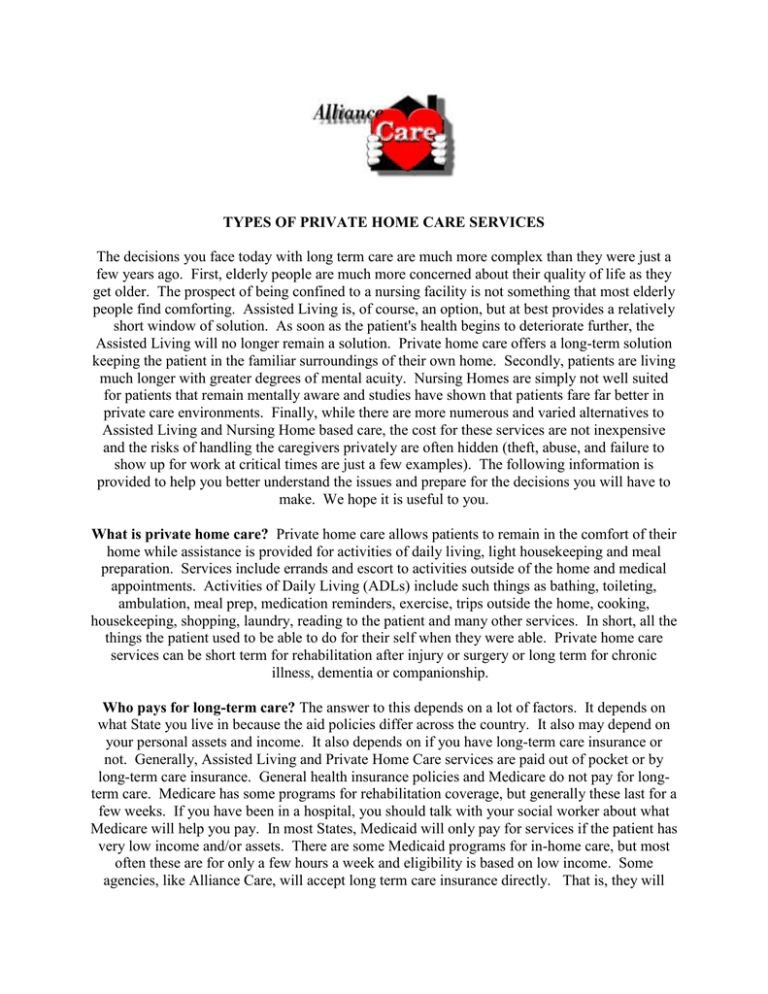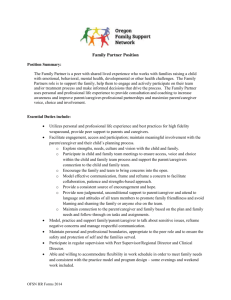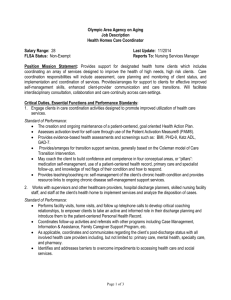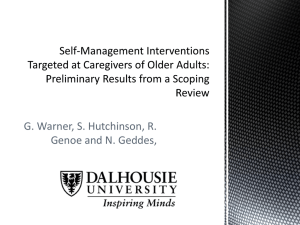What should the services include? Are there risks to
advertisement

TYPES OF PRIVATE HOME CARE SERVICES The decisions you face today with long term care are much more complex than they were just a few years ago. First, elderly people are much more concerned about their quality of life as they get older. The prospect of being confined to a nursing facility is not something that most elderly people find comforting. Assisted Living is, of course, an option, but at best provides a relatively short window of solution. As soon as the patient's health begins to deteriorate further, the Assisted Living will no longer remain a solution. Private home care offers a long-term solution keeping the patient in the familiar surroundings of their own home. Secondly, patients are living much longer with greater degrees of mental acuity. Nursing Homes are simply not well suited for patients that remain mentally aware and studies have shown that patients fare far better in private care environments. Finally, while there are more numerous and varied alternatives to Assisted Living and Nursing Home based care, the cost for these services are not inexpensive and the risks of handling the caregivers privately are often hidden (theft, abuse, and failure to show up for work at critical times are just a few examples). The following information is provided to help you better understand the issues and prepare for the decisions you will have to make. We hope it is useful to you. What is private home care? Private home care allows patients to remain in the comfort of their home while assistance is provided for activities of daily living, light housekeeping and meal preparation. Services include errands and escort to activities outside of the home and medical appointments. Activities of Daily Living (ADLs) include such things as bathing, toileting, ambulation, meal prep, medication reminders, exercise, trips outside the home, cooking, housekeeping, shopping, laundry, reading to the patient and many other services. In short, all the things the patient used to be able to do for their self when they were able. Private home care services can be short term for rehabilitation after injury or surgery or long term for chronic illness, dementia or companionship. Who pays for long-term care? The answer to this depends on a lot of factors. It depends on what State you live in because the aid policies differ across the country. It also may depend on your personal assets and income. It also depends on if you have long-term care insurance or not. Generally, Assisted Living and Private Home Care services are paid out of pocket or by long-term care insurance. General health insurance policies and Medicare do not pay for longterm care. Medicare has some programs for rehabilitation coverage, but generally these last for a few weeks. If you have been in a hospital, you should talk with your social worker about what Medicare will help you pay. In most States, Medicaid will only pay for services if the patient has very low income and/or assets. There are some Medicaid programs for in-home care, but most often these are for only a few hours a week and eligibility is based on low income. Some agencies, like Alliance Care, will accept long term care insurance directly. That is, they will work with you to gain eligibility, file ongoing claims for you and then accept payment directly from the insurance company. Be sure to ask about this before you start care. O.K, I can afford the care or I have insurance. I think I need care. How do I start the process? Each insurance company has their own forms and process for beginning care. There are also different kinds of policies with different provisions within the same insurance company. Talk with your agent or give us a call. We can help you understand what your insurance company expects you to do and can often help you get it completed. If you don't have insurance and intend to pay privately for care the best thing to do is call a reputable Home Care Agency. Ask them to send you information. Some other key points: Be sure to ask the Agency if they use contractors or if the caregivers are their employees. Be sure to ask the Agency if they use contractors or if the caregivers are their employees We will discuss this later, but trust me you absolutely do not want to work with anyone that does not hire the caregivers as W2 based workers. Make sure that their care services are provided by Certified Nurse Assistants (CNAs) who have passed a state approved written and clinical tests. At better agencies, all services are supervised by a Registered Nurse, but often agencies do not have nursing staff, so ask. Likewise, an R.N. or L.P.N. should make regular home visits to supervise the caregivers and written individual care plans should be in place for each client. These plans should be updated at least every 90 days by the R.N. Again, this is an important question to ask. What kind of care will the Agencies provide? Hourly Care – Hourly care services are paid for on an hourly basis, with usually a minimum of 4 - 6 hours being required. Hourly caregivers are to be available during their entire shifts and should never sleep on the job. The primary task for a caregiver is to take care of the patient, but they should use some of their time to do light housekeeping services and other general tasks to assist good quality care. Hourly care is usually scheduled in regular shifts for regular days, but it can be used on a demand basis and is available for to 24 hours per day. Live in Care - Live in caregivers actually live with the clients, sleeping at night when the client sleeps and being awake during the day with the client. It is a requirement that the caregiver gets 8 hours of sleep at night while the client is asleep, but they remain in home with the client. Caregivers will prepare meals for both the client and themselves with the food being provided by the client. A separate sleeping area should be provided by the client. This can be a comfortable pull out sofa or day bed in another room. Care Giver Job Duties: Personal Care- bathing, oral care, bathroom assistance, hair and nail care, dressing, grooming, medication reminders, ambulation, transfers, etc. Light Housekeeping- vacuuming and dusting, changing linens, cleaning, kitchen, bedroom and bath, sweeping the floor, damp mopping, laundry and ironing. Food Preparation- preparation of meals and clean up in the kitchen- meals will be prepared according to dietary needs. A nurse is available for consultation. Clients will be fed if necessary Errands and Transportation- the caregiver can provide transportation in their car or the client’s car. When using the caregiver’s car a mileage fee will be assessed using the most recent IRS allowance. Caregivers can do errands such as shopping or picking up drug store orders. Escort service to MD appointments, church or other activities is also provided. A liability release form must be signed prior to transporting clients TIPS FOR FINDING A HOME CARE AGENCY Is there a registration fee? Alliance Care does not charge a registration fee or require a minimum number of hours each week, but many agencies do charge such fees. Simply do not sign with an agency that charges such fees. Does the Agency carry professional and general liability insurance? What happens if an accident happens in your home or something is missing? Likewise, many Agencies do not allow caregivers to drive patients to doctor’s appointments or other errands. Be sure the Agency carries Non-Owned Automobile coverage if they will be driving you or running any errands for you. Otherwise, YOU could be responsible for the cost. Are the care givers Agency employees or contractors? This is one of the most important questions the patient or their family should ask. Someone is responsible for income tax and social security withholdings. If they are contractors to the patient, then the patient is responsible to the IRS. Don’t let these companies fool you. This is costly and they want YOU to have that cost. Likewise, if the caregiver is injured on the job whose insurance will cover it? Not the contracting company’s, that is certain. It falls to the patient and homeowner’s coverage does not extend to employees. Simply do not use an agency that uses contractors for employees. Does the Agency carry workers compensation for employees? Contract employees (non W2) are generally not covered by workers compensation insurance, only actual employees. Just because a company says they have coverage does not make it so. If you have any doubt, ask for a copy of the Declaration page of the coverage. Legitimate companies will have no problem with this. Private caregivers NEVER have coverage. If they are injured at your home you will be responsible and your homeowners will not cover it. Does the Agency do criminal background checks? If someone is in your home, especially with an elderly person, you should be sure of their background. Also, internet (on-line) checks are not reliable. Anyone working in your home should have a letter on file from a local law enforcement agency that has checked the FBI data base. These are easily and available. What are the requirements of the contract I will sign? You should not sign a contract requiring minimum charges or amount or service. You should only pay for services you receive. If you need to cancel services you should be able to do so without penalty. If a company is sure of the quality of its service it will not require a minimum guarantee. What happens if my caregiver is sick or cannot work? One of the benefits of using some agencies, like Alliance Care, is that a qualified replacement caregiver will be available to fill in if your regular caregiver is ill or needs a day off. Be sure to confirm that the Agency makes this commitment to you. What happens if I have a problem after business hours? There should be someone on call 24 hours 7 days a week to respond to calls. Is there a nurse available for questions? The on-call staff should be able to access a nurse any time.







